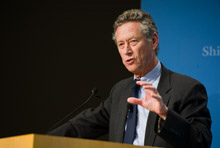
Typical street scene in Santa Ana, El Salvador. (Photo: iStock)
IMF Survey: Top Economists Ponder Post-Crisis Realities
March 30, 2012
- Fresh policy approaches needed in a new era
- Standard economic models provide inadequate guidance
- Macroeconomic policy is at a critical juncture
A new book is encouraging a wholesale rethinking of macroeconomic policy principles following the global economic crisis.

Olivier Blanchard: “We have moved from a one-target, one-instrument world to one where there are many targets and many instruments.” (photo: IMF)
GLOBAL ECONOMIC CRISIS
In the Wake of the Crisis: Leading Economists Reassess Economic Policy is a compilation of papers presented at a groundbreaking IMF conference in March 2011. The conference—attended by prominent academics and policymakers—aimed to take stock of the policy questions posed by the crisis and promote discussion about new economic policy approaches for the post-crisis era.
Edited by IMF Chief Economist Olivier Blanchard, David Romer of the University of California at Berkeley, Michael Spence of Stanford University, and Joseph Stiglitz of Columbia University, the book captures the state of macroeconomic thinking at a transformational moment.
Traditional models fall short
The crisis and the weak recovery that has followed raise fundamental questions concerning macroeconomics and economic policy, the authors find.
For instance, to what extent are financial markets efficient and self-correcting? How crucial is low and stable inflation for growth and the real stability of the economy? How strong is the case for open capital markets? Too often, the standard models provided insufficient guidance on how to respond to the unprecedented situations created by the crisis. As a result, policymakers have been forced to improvise, the book says.
Throughout the book, these top economists mull over future directions for monetary policy, fiscal policy, financial regulation, capital account management, growth strategies, the international monetary system, and the economic models that should underpin thinking about critical policy choices.
Among the new realities they consider are the swing of the pendulum toward regulation; the need for new theoretical approaches, incorporating advances in agency theory, behavioral economics, and the understanding of credit markets and finance based on theories of imperfect information. The book also discusses how important it is for macroeconomic policy to target not just inflation but also output and financial stability.
In the Wake of the Crisis is available from the MIT Press.







